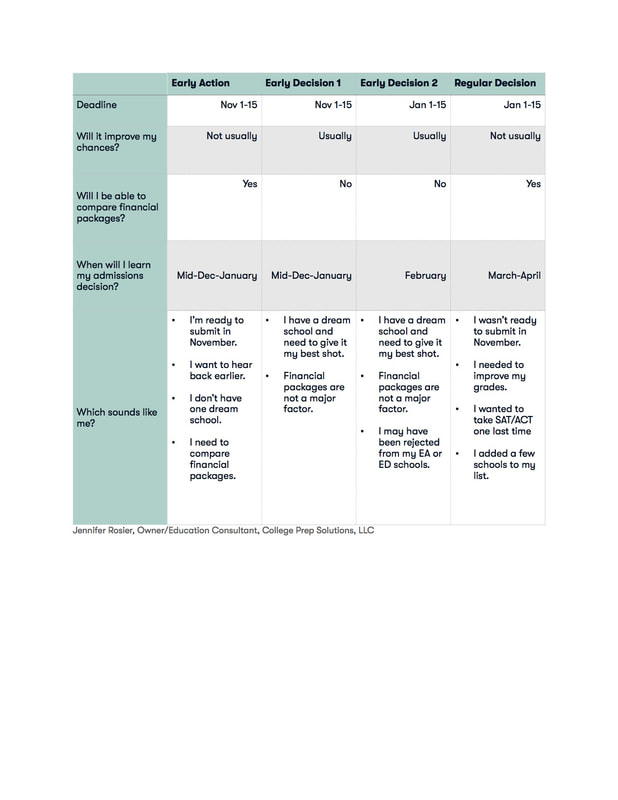A college admissions counselor's candid response and advice to her studentsDear Students, I’m sure you’ve heard by now about the college admissions scandal sweeping the country. I just needed to write to you as I can imagine that you feel some of the same feelings I do. I’m ashamed by our system. I’m skeptical. I’m ANGRY. But if I’m honest, I’m also not entirely surprised. Throughout your lives you will encounter people who cheat, lie, and use unfair influence to get what they want. It’s a sad reality. But, I also feel thankful and proud to work with you- who work so hard every day to live out your goals- and with your parents- who share the honest goal of helping you meet your true potential. Let’s put this into perspective. Sure, there are 40 or so students who were accepted to elite colleges because of this fraud scheme, and there are likely thousands more. But there are hundreds of thousands who have succeeded on their own merits. I’ve always said that there are things we can control in college admissions, and others that we can’t. As you grow older, there will be many other situations that you can’t control. So, it’s okay to feel skeptical, cheated, or really mad. But just keep doing what you do every single day: enjoy your high school experience, work hard, and focus on all that you can control. In the end, your grit, integrity, work ethic, and character will define your future success and happiness much more than the name brand of the college you land in. Just keep being you, and you’ll feel an incredible sense of pride in the end. I promise! Warmly, Jen Jen Rosier Founder PrepU Admissions and Test Prep
2 Comments
Deferred? Advice and Actions You Must Take
With dramatically increasing numbers of applicants, universities are consistently deferring qualified applicants to the regular decision pool. Whether your early action or ED school was a "Hail Mary" or a carefully targeted "safety" school, a deferral stings. Deferrees- take heart! Though disappointing, this interim decision has a silver lining: the college or university views you as a well-qualified and worthy applicant! The bottom line is that the common application has made applying as simple as the flick of the wrist. Admissions folk are well aware that many students apply to upwards of 20 schools, many of which they've barely researched. If your interest in xxx university is genuine, there are a few key steps you can take to improve your chances of admission: 1. Email your regional admissions counselor. Most colleges have a feature to search for your local admissions counselor who was most likely the first person to review your application. Email this person as soon as you can. The intent is to prove your continued interest in the school. Be polite, humble, and succinct. Some schools will offer a cursory response, while others will provide valuable insights. Either way, you're proving your interest.Here's a sample letter: " I learned yesterday that I've been deferred from xxx. I was disappointed since xxx is my top choice school, but I appreciate the chance for reconsideration. If you could share with me any factors that may have delayed my acceptance, I will be very grateful. What can I do to further improve my future chances of admission?" You will also want to include new, relevant updates about you! Universities aren't interested in receiving the same information they've already seen. Examples:
3. Send a new letter of recommendation. First, carefully review university policies about recommendations. Some are clear that they only want two, while others welcome all recommenders. Solicit a recommendation from a trusted adult who can illuminate another side of you. Examples include a coach, boss, or an arts instructor. Ask your recommender to address the letter to your college of choice. 4. Consider snail mail. Compare the number of emails you receive to the number of good old USPS letters you receive. The same applies for admissions departments. Sending a letter of interest to your regional admissions officer is a way to stand out! 5. Attack Plan B. I know you're tired. I know you wanted to be done. Forge ahead with applications to your regular decision schools. Regroup and carefully assess your other options, and start your work on new applications. Many schools have regular decision deadlines of January 1, 15, or even February 1. 6. Think big picture. Chances are that if you are reading this article, you are invested in your future. Call me cheesy if you're inclined, but let's gain some perspective. There are thousands of colleges and universities in our nation. There is one that's right for you. You can't control everything, but you can control your own success wherever you land. JNeed help with regular decision applications? We're here for you, and we work with students all over the world. Book a free consultation here. How to maximize your potential financial aid awards and complete the form without going crazy!
What You'll Need on Hand
Will applying early improve my chances? What’s the difference between ED and EA? What about financial aid?
As a college admissions consultant, I hear these questions every day! And I get it. This stuff is confusing. How you apply to colleges can dramatically impact both your acceptances and your financial packages. Your application strategy needs to be tailored to your family’s academic goals and financial considerations. While every university has its own admissions policies and historical data, this simple table will give you a little information to get started. From here, work with a professional education consultant or your school guidance counselor to craft your own application strategy. Here are a few tips you need to know:
At PrepU, we’ve helped thousands of families make strategic application plans based on their financial and academic goals. Feel free to reach out if you need help maximizing scholarship dollars or applying to your dream school with confidence! www.collegeprepsolutions.com 781.526.4192
Rejected.
When my 25 year old son reads this post, he’ll text me a signature one-word text: “Really.” It was college admissions decision season nine years ago. I was a level-headed college coach by trade, and a freakish, anxiety-ridden beast of a Mom at heart. Each morning, I’d watch my son leave for school in his fresh 1987 Toyota Corolla, and get to work. Coffee. Check. Phone off. Check. I needed complete focus. I was on a week-long mission to crack the code of the password to my son’s University of Southern California applicant site, which I had so correctly told him was “his personal business.” While I coached my client families to let their kids “own the application process,” I attempted and re-attempted every possible password. Riley? (family dog). Nope. Nomar? (favorite childhood Sox player). Nope. I lovemymom2011? (A girl can dream). Each morning I’d make my educated guesses until the warning flashed, “ your account will be locked on the next attempt.” It was easy to justify: I had to know if my son had been rejected from his dream school before he did, right? What would I say? Would I paste a Miss America smile on my face or sob along with my baby boy? How could I fix this kind of failure? I needed to prepare. The actual rejection story was much less dramatic. I was curled up on the couch watching Friends when my son casually stepped into the doorway, muttered “I got rejected,” then retreated to his room. I was left alone, clueless about what to say to him, and choking back the tears I was too embarrassed to let fly. Let's admit it. Our generation can't stand to see our kids fail. Give a quick glance at your child's bookshelf; chances are it is lined with participation trophies and certificates of appreciation. Maybe that's what makes college admissions so uniquely wrenching: for the first time in our kids’ lives, they are thrown to the wolves, to be judged by complete strangers, and there’s nothing we can really do about it. Most of us go in to the challenges fully aware that rejection could occur. We are reminded of the competitive landscape, but we still aim high. Yet somehow, when the rejection letter arrives, we are heartbroken. How will my child bounce back? Like any good college coach, or at least the honest ones, I'll admit that I've worked with families through their fair share of rejections. Here's my advice for parents:
Postcript Guinea Pig Kid Number 1 graduated from his next-to-last-choice school with honors, and reports he can’t imagine being so happy at any other school. He doesn’t live in my basement, and he is happy and successful in Cambridge. I've never hacked the passwords of kids numbers 2 and 3. About the Author Jen Rosier is owner and founder of PrepU Admissions and owner of Tutor Doctor Suburban Boston. For more than 25 years, Jen and her team have helped thousands of families from all over the world to envision and achieve their academic dreams. An expert in test prep and admissions, Jen is all about de-stressing and simplifying the admissions process. Oh, and helping families to afford a college education!
Tips for Improving Your Chance of Admission After You’ve Hit Submit Go ahead. Pat yourself on the back. Completing your applications is a major accomplishment. So take a day or two off to bask in your awesomeness, then get back to work on a few tasks that can help you nail an acceptance! Don’t make the mistake of going rogue when you can still influence your admissions decision.
1.Check Your Email. You should receive an email from each school you’ve applied to acknowledging receipt of the application and providing a login to a student portal. CHECK YOUR PORTAL to make sure that each school has received all of the components of your application. Commonly missing materials include forgotten SAT/ACT scores, school transcripts, or recommendations. If you are missing any items, call the school to confirm, as sometimes the portal isn’t updated immediately. Then, save the login as a bookmark on your web browser, because you a few months from now you will check in there for your admissions decision! 2. Check Your Finances. If you haven't already done so, work with your parents to complete the necessary financial aid forms, the FAFSA and for some schools, the CSS. Also, keep working to find school-specific, local, and national scholarships. 3. Interview. If your school offers optional interviews, book them as soon as possible! You should take any opportunity to prove your genuine interest even if the requirement is “optional.” 4. Visit. Scan the website for additional admissions events either in your local area or on campus. Winter and Spring Open Houses often offer major-specific information sessions, These are a great time for you to make another mark on campus and learn specifics about your program! 5. Introduce Yourself. Most admissions departments are set up with regional reps who handle different geographic areas. These reps will most likely be the first to read your application. If you haven’t already done so, now is a great time to introduce yourself! You can find your rep by calling the admissions office or perusing the website. Keep it simple: introduce yourself and provide a memorable detail, reiterate your interest, and ask a specific question, but don’t waste their time. 6. Social Media Scan. Believe it or not, many admissions counselors will take the time to check out an applicant’s social media profiles. Be smart. Rule of thumb: for the time being, post like your grandmother follows you. 7. Update on Accomplishments. If you’ve achieved any significant accomplishments since your submission date, let your rep know in an informal and friendly email. What’s worth sharing? 8. Keep your grades up. Just do it. Most teachers will start to let up on you a little soon enough. Don’t throw 13 years of hard work away now. 9. Try Not to Obsess. Now that you’ve really done all you can, try not to obsessively check for admissions decisions. Your best bet? Check the site to learn the admissions decision delivery date, mark it in your calendar, and THEN check the status! Jen Rosier, Owner and Founder, PrepU Admissions and Test Prep Early Action...Early Decision... |
AuthorJen Rosier is owner and Founder of PrepU and owner of Tutor Doctor Suburban Boston. An expert in admissions and test prep, Jen is all about simplifying and de-stressing the admissions process. Oh, and helping families afford an education! Archives
March 2019
Categories |
||||||
Proudly powered by Weebly










 RSS Feed
RSS Feed